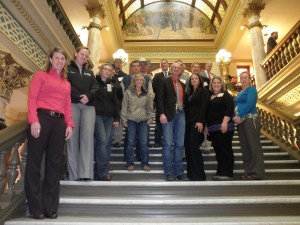NCBA and PLC Support the Modernization of Endangered Species Act
 (via NCBA Beltway Beef) The Endangered Species Act has become one of the most economically damaging laws facing our nation’s livestock producers. When species are listed as “threatened” or “endangered” under the ESA,the resulting use-restrictions placed on land and water, the two resources upon which ranchers depend for their livelihoods, are crippling.The ESA has not been reauthorized since 1988 and is in great need of modernization.
(via NCBA Beltway Beef) The Endangered Species Act has become one of the most economically damaging laws facing our nation’s livestock producers. When species are listed as “threatened” or “endangered” under the ESA,the resulting use-restrictions placed on land and water, the two resources upon which ranchers depend for their livelihoods, are crippling.The ESA has not been reauthorized since 1988 and is in great need of modernization.
The National Cattlemen’s Bee Association and the Public Lands Council support all attempts to modernize and streamline the ESA and have provided several recommendations to Congress. The House of Representatives Endangered Species Act Congressional Working Group released a report in February 2014 which gave several recommendations for ESA improvements.The report concludes that the ESA “while well-intentioned from the beginning,must be updated and modernized to ensure its success where it matters most: outside of the courtroom and on-the-ground. ”The working groups’ recommendations echo our organizations’ recommendations.
NCBA and PLC submitted a letter of support this week for four bills that are a direct result of the findings that are covered in the working groups’report.
H.R.4315, the 21st Century Endangered Species Transparency Act introduced by Representative Doc Hastings (R-WA),requires data used by federal agencies for ESA listing decisions (including proposed listings) to be made publicly available and accessible through the Internet. The public should be able to see the information that their government is using to make listing decisions that ultimately affect everyone.
H.R.4316, the Endangered Species Recovery Transparency Act introduced by Representative Cynthia Lummis (R-WY), requires the Interior Secretary to report and comprehensively track ESA litigation costs, including attorneys’ fees, and post it on the internet. We must hold people accountable for the monetary resources,taxpayer money that is spent.
H.R.4317 the State, Tribaland Local Species Transparency and Recovery Act introduced by Representative Randy Neugebauer (R-TX),requires the federal government to disclose to affected states all data used in ESA prior to any listing or proposed listing decision. It also ensures that “best available scientific and commercial data” used by the federal government will include data provided by affected states, tribes,and local governments.
H.R.4318, the Endangered Species Litigation Reasonableness Act introduced by Representative Bill Huizenga (R-MI),caps hourly fees paid to attorneys that prevail in cases filed under ESA, consistent with current law under the Equal Access to Justice Act.Currently, no cap on attorney fees exists under the ESA allowing attorneys to be awarded massive sums of taxpayer money.
The ESA,while designed to protect species from endangerment of extinction, has proven itself o be ineffective and immensely damaging to our members’ ability to stay in business. Less than two percent of species placed on the endangered list have ever been deemed recovered.
Environmental activist groups’ list-and-litigate routine costs not just producers, but taxpayers, as well.These groups have a habit of suing the federal government to force the listing of a species,then suing to prevent species delisting—even after recovery goals have been met.Their legal expenses are often reimbursed by the American taxpayer. It is no small wonder when environmental radicals can keep themselves well-funded by a seemingly endless stream of taxpayer dollars that so many species have been listed and so few have been delisted. While not a complete fix, these four bills take some of the necessary steps to repairing this broken law.










